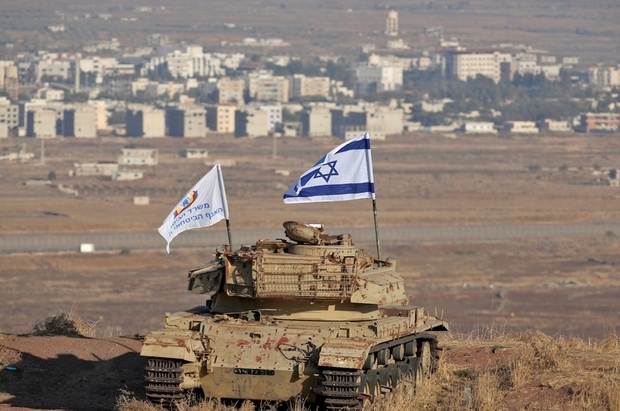'Miscalculation' in Syria could lead to wider regional war, warns report

Iran and Israel are only one "miscalculation" away from war as both sides escalate their military interventions in Syria, a new report says.
The International Crisis Group (ICG) said that the increasing willingness of Israel to use force against Iran-backed targets, including the Lebanese militia Hezbollah, in Syria means that the seven-year conflict could end up spreading beyond its current border.
"'Rules of the game' that contained Israeli-Hezbollah clashes for over a decade have eroded," said the report, titled Israel, Hizbollah and Iran: Preventing Another War in Syria.
"New rules can be established in Syria by mutual agreement or by a deadly cycle of attack and response in which everyone will lose. A broader war could be one miscalculation away."
ICG is an international NGO whose stated mission is to prevent and resolve deadly conflict.
The report urged Russia, which it identified as the only real mediator between Iran and Israel, to play a more active role in averting a potential escalation.
"Russia should broker understandings that bolster the de-escalation agreement distancing Iran-backed forces from Syria’s armistice line with Israel; halt Iran’s construction of precision missile facilities and its military infrastructure in Syria; and convince Israel to acquiesce in foreign forces remaining in the rest of Syria pending a deal on the country’s future," it added.
Although Israel and Iran are fierce enemies, Russia has maintained good relations with both countries.
Israeli warplanes struck a Syrian military position in a rural area near Damascus on Wednesday, triggering Syria's air defence system which destroyed most of the missiles, a Syrian army statement carried by state television said.
The statement said several missiles were launched by the Israeli jets from inside the territory of neighbouring Lebanon at 3:42am local time.
The Syrian army said it had destroyed most of the Israeli missiles fired at its position, but did not give details of any damage or casualties.
The Israeli air force has said it struck arms convoys of the Syrian military and Lebanon's Hezbollah nearly 100 times since the war in Syria began more than six years ago.
Although officially Israel regards Syria under Bashar al-Assad as an enemy state, the country has largely avoided wider direct involvement in the war.
But Israeli officials have repeatedly warned that they will not allow Syria to become a haven for Hezbollah and other groups that would attempt to attack Israel in the future.
France’s foreign minister on Wednesday demanded that all Iran-backed militias, including Hezbollah, leave Syria, saying that Iran (as well as Turkey) were violating international law through their actions in the country.
Asked on French television whether he wanted Turkish armed forces to withdraw from Syria, Jean-Yves Le Drian replied that he wanted “the withdrawal of all of those who ought not to be in Syria, including Iranian militia, including Hezbollah”.
The ICG report warned that, despite Russia's good relations with Israel, the Russian airforce intervention in Syria - which began in 2015 - could end up benefiting Hezbollah in its efforts against Israel.
"As Israel sees it, were Moscow to back Assad’s recapture of the south, the result would be the same: Hezbollah and Iranian forces would reach the Golan Heights and ultimately build offensive infrastructure there," it said.
It added that Israel had "updated its red lines – signalling it would take matters into its own hands if necessary to keep Iran from establishing a permanent military presence in Syria".
- Additional reporting by Reuters
This article is available in French on Middle East Eye French edition.
Stay informed with MEE's newsletters
Sign up to get the latest alerts, insights and analysis, starting with Turkey Unpacked
Middle East Eye delivers independent and unrivalled coverage and analysis of the Middle East, North Africa and beyond. To learn more about republishing this content and the associated fees, please fill out this form. More about MEE can be found here.




